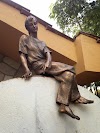This time I share what Fr Marco Marini IMC wrote about their visit to the Diocese of Manzini.
During the canonical visitation to the Delegation of South Africa, the Superior General, Fr. Stefano Camerlengo IMC and his General Councilor, Fr. Marco Marini IMC, decided to pay a visit to Bishop José Luis Ponce de Leon IMC.
As you know Bishop José Luis is the Vicar Apostolic of the Vicariate of Ingwavuma, in the southern east part of South Africa, and you might expect the meeting to have taken place in the South African territory. Instead - after a long journey from Merrivale accompanied by the Superior of the IMC South African delegation, Fr. James Mwigani IMC - the meeting took place in Manzini, the commercial capital of Swaziland.
In fact nowadays Bishop José Luis besides being in charge of the Vicariate of Ingwavuma, he has been entrusted with the administration of the Diocese of Manzini after the death of the late Bishop Louis Ncamiso Ndlovu OSM, while waiting for the Holy See to appoint a new bishop to the Diocese of Manzini, which was erected back in 1951.
It was a family reunion. Great was the joy of meeting again after many years. Bishop José Luis, who worked for many years in South Africa in the dioceses of Dundee and Johannesburg, had served as the General Secretary of the Consolata Missionaries in Rome, before being appointed Vicar Apostolic by Pope Benedict XVI.
Bishop José Luis nowadays spends his days between his Vicariate and the Diocese of Manzini. The Diocese is the only one in the whole territory of Swaziland. The country has a population of about 1.1 million people, with Catholics being about 5% of the total population.
The diocese has 15 diocesan priests and around ten religious priests: Salesians and Servants of Mary. But in spite of the relative low number of Christians and priests, the diocese is well organized and socially active.
One of the country's major hospitals, co-financed by the Swazi government, and managed by the Catholic Church, is considered one of the best of its kind for the services it offers. Among the educational institutions and schools, the most prestigious is the one run by the Salesians in Manzini itself.
In the tour of the different institutions and activities the Bishop gave to Frs. Camerlengo, Marini and Mwigani, Hope House is the most impressive. A center where terminal ill patients – Aids, cancer – discharged by hospitals, are taken care. A place where in a familiar environment they are helped to recover or die with dignity, surrounded by their family. Every patient lives in a small self contained house accompanied by one or more members of the family. This family environment and the care of the personnel employed in the center make a different: about 80 percent of the patients are able to walk out of Hope House and return to their normal life, homes and families.
The Bishop's house itself is located in a street alined on both sides by several Catholic institutions and the cathedral itself. Literally surrounded by them.
The presence of the Catholic Church has definitely made a deep impact in the life of the Swazi society, as a number of influent members of the society have been formed and trained by Catholic institutions. Next year, 2014, the Catholic Church will celebrate the centenary of the arrival of the first Catholic missionaries in the country. The Congregation of the Servants of Mary, originally from Italy, were entrusted in 1913 with the Vicariate and subsequently the Diocese of Manzini. They too will celebrate their hundred years of presence at the service of the people of this country and the Diocese. To mark the centenary of evangelization of the Catholic Church in Swaziland, next January 2014 a great event will be staged in Manzini.




